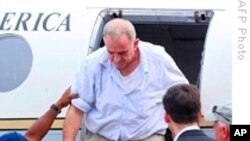Click here for Lao version/ຄລິກບ່ອນນີ້ເພື່ອອ່ານພາສາລາວ
<!-- IMAGE -->Burmese authorities have
freed John Yettaw, who was convicted and sentenced following his uninvited
visit to pro-democracy leader Aung San Suu Kyi 's house. In charges stemming
from that incident, Ms. Suu Kyi was given an additional 18-month sentence,
extending a detention that has lasted for much of the last 19 years.
While the United States welcomes Mr. Yettaw's release, it remains very
concerned about the continued detention of Ms. Suu Kyi and more than 2,100
other political prisoners, including Min Ko Naing, Ko Ko Gyi, and Su Su Nwe, who
have been denied their liberty because of their pursuit of a government that
respects the will, rights, and aspirations of all Burmese citizens.
While traveling in Burma in early May, Mr. Yettaw swam across a lake near Ms.
Suu Kyi's home, driven he said by a vision that terrorists were bent on killing
her. He was sentenced to a seven-year prison term, including four years of hard
labor, on charges that he violated the terms of her house arrest. For allegedly
harboring him, Ms. Suu Kyi's sentence extends a detention that has lasted for
much of the last 19 years.
President Barack Obama said he was pleased with the Burmese government's
decision to free Mr. Yettaw. Burma has essentially been a military dictatorship
for most of the last forty seven years, and the U.S. has been looking for signs
that Burma is fundamentally changing its policies. Mr. Yettaw's release,
however well intended, is not an indication that that is happening.
Thousands of political activists remain in jail. Their release would be
significant. Burma's military leaders should also engage in a meaningful
dialogue with their political opponents and move toward a peaceful transition
to genuine democracy and national reconciliation.





